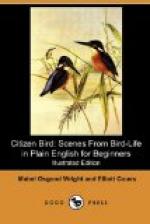“Some frosty morning in October, if you hear a sound coming from the sky, like the tinkling of little bells—’Tlink-link-link-link’—you may be sure there is a flock of Crossbills near, and soon you will see them climbing about an evergreen, or quietly picking seeds on a birch or beech. The moment before they move to another tree they begin to call; this is the only note you will be likely to hear from them, and one which they often keep up during flight.
“They are capricious birds when on their travels, sometimes letting you come very near them without showing a sign of fear, then suddenly taking flight and dashing about in a distracted way. They are also tardy in getting back to their piney homes sometimes, and choose their mates on the journey, unlike most birds. Very often a thoughtless couple are obliged to camp out and build a home wherever they happen to be, so that their nests have been found in several of the New England States.”
“Is there only one kind of Crossbill in North America?” asked Rap.
“No, this Red Crossbill has two cousins; one with two white bars on each wing, called the White-winged Crossbill, who sometimes travels with him, but is rarer; and another who lives in Mexico.”
The American Crossbill
Length about six inches.
Beak crossed at the tips, but looking like a Parrot’s if you do not notice how the points cross.
Male: general color Indian red, with dark wings and tail.
Female: general color dull olive-green, with wings and tail like the male’s.
A Citizen of the North, making winter excursions all
through the United
States.
THE AMERICAN GOLDFINCH
(THE JOLLY BIRD, or THISTLE BIRD)
“This must be my other bird,” said Nat, “the yellow one from the wild grass meadow, who had what looked like a little black velvet cap tipped down over his eyes. They are such jolly little chaps that it made me laugh when I watched them swinging on the ends of the tall grass. Once in a while one would play he was angry and try to look cross; but he couldn’t keep it up long, because he really felt so good natured.”
“I believe every one knows Goldfinches,” said Olive. “I remember them longer than any birds, but the Robin and Bluebird.”
[Illustration: American Goldfinch]
“Yes, for even I know them a little bit,” said Dodo, “but not by their right name, for when I saw some in the Park last summer somebody said they were wild Canaries that had flown out of cages.”
“What do they eat, cones or little seeds?” asked Nat.
“They eat grass-seeds, and the seeds of weeds—the most fly-away weeds too, that blow everywhere and spread ever so fast,” said Rap. “Look, quick! There’s a flock coming by now, and they are calling ’Come talk to me! Come talk to me!’ See—they have settled on the long grass by the fence and are gobbling seeds like everything,” continued Rap in a whisper.




